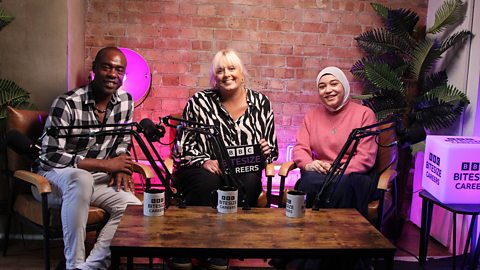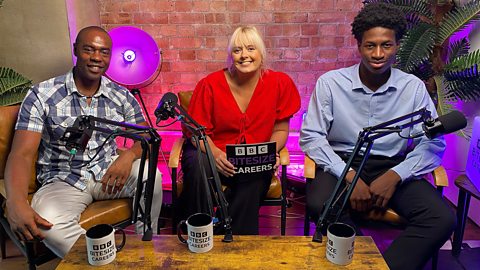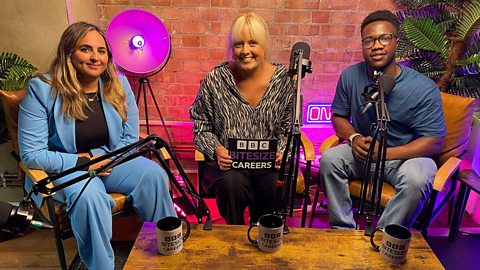The Bitesize Careers Podcast: How do I write a CV and cover letter?
Join us for top tips on the major dos and don'ts of CVs and cover letters, how to get started and what to do once you've hit send.
Series two of The Bitesize Careers Podcast is tackling the most popular questions you've asked about the world of work. In this episode, Radio 1's Katie Thistleton talks all things applications with careers expert Shoshanna Davis and student Samantha. Today's big question is:
How do I write a CV and cover letter?
Katie
Hello and welcome to The BBC Bitesize Careers Podcast. This is the podcast where we try and help you figure out what you want to do in the future. This podcast is for you, the young people who are just starting out on that career journey. In each episode, we answer one of the hundreds of questions you've told us you want the answers to, and some of the questions that you don't even know you've got yet. In this episode, we are going to be trying to answer the question: how do I even start writing a CV if I've never had a job? It's a good question, it's a question that I definitely had. My name is Katie Thistleton. I'm going to be your host, and joining me today to try and help me answer that question are two very special guests. We've got Shoshanna Davis – who is a career expert – here to give you all the top tips, and also Samantha, who is still at school so, like many of you, is just starting to think about her next steps. Now, before we actually get into today's episode, I think we need to start with the big question: what actually is a CV? Shoshanna? What does it stand for?
Shoshanna
The term CV stands for “curriculum vitae”, which is a Latin phrase meaning “the course of life”. But don't worry, you don't need to know any Latin to write your first CV. Essentially, what a CV is, is a one-page document which allows you to summarise your skills, experience and motivation, and helps employers determine and understand why you’d be a great fit for the role.
Katie
I had no idea that it stood for “the course of life”. It's very deep, isn't it?
Shoshanna
Very, very deep.
Katie
I like that – that's made me like CVs more, actually. OK, so before we try and answer that question about how you write your first CV, let's play a little warm-up game. I'm going to give you three items, and you guys need to decide which ones you'd put in a CV and which ones you wouldn't. So out of the three you've got to pick two that would go in your CV and one that you’d leave out. Are you ready?
Samantha
Yes.
Katie
OK. Set number one: I love sport, I like problem-solving, and I love my mum. Which one would you leave out? Which two would you put in your CV?
Samantha
I think it's probably worth mentioning a love for sport and problem-solving, but I think, yes, it's sweet that you love your mum, but probably not the best thing to mention in a CV.
Katie
I mean, it's really lovely. It's very nice, isn't it? It's good to love your mum. But there's a time and a place. You could put that in a birthday card, couldn't you?
Shoshanna
Yep. Agreed. As lovely as it is, probably not going to be super relevant for the job you're applying for, but absolutely, Samantha, um, the fact that you like problem-solving and you enjoy sport, those are both great things which show an employer you've clearly developed lots of skills which would be relevant for plenty of jobs. So, absolutely.
Katie
Amazing. Let's do another round, and play along as well wherever you're listening and watching. OK: school subjects you enjoy, hobbies, and your favourite food. Which two would you put in your CV? Which one would you leave out?
Samantha
I would go for school subjects that I enjoy and hobbies because I think they're more relevant and they show that you're passionate about certain things and certain subjects.
Shoshanna
Yes. Agreed. School subjects are definitely relevant, and also hobbies are great to include as they allow the employer to kind of get to know you a little bit better on a, kind of, more personal level.
Katie
OK, now we're all warmed up. Let's get into the actualities of writing a CV, shall we? Because I think that's what everyone wants to know. Samantha, what are people asking on the Career Question Wall?
Samantha
OK, so how do you even start writing a CV?
Shoshanna
The first thing I recommend including is your personal information. So, that would be your full name, your email address, your mobile number and also your location so an employer can understand where you're located. You don't need to include your full address.
Samantha
OK. And what about social media?
Shoshanna
So, I would say if your social media handles are relevant. So, if you have a social media account where it's you showcasing your work and is used as a portfolio, then absolutely do include your social media handles at the top personal information section. However, if your social media handles are not relevant, you do not need to include them.
Katie
OK. Well, that's straightforward: personal information. We can do that. What comes after that?
Shoshanna
Next would be the personal profile section. So, think of this like an “elevator pitch”. This is a kind of short section of around three to four lines, where you essentially outline who you are, what your experience is, what your motivations are, and kind of what industries and roles you're interested inexploring.
Katie
Great. What's after personal statement?
Shoshanna
Next after personal statement is the education section. So, here you would include any relevant subjects that you're studying, as well as including either your grades or your predicted grades for those.
Samantha
OK and should you list, like, every single subject?
Shoshanna
I would say you don't need to list every single subject. As, you know, usually when you're studying, it can be lots of subjects. So, I would stick to just the most relevant ones you feel for the role you're applying for.
Katie
Amazing. What's after education?
Shoshanna
The next section after education would be work experience. So, this is where you can include any relevant work experiences you have, whether that be work placements throughout school, whether that be any extracurricular activities, whether that be little side projects you're completing in your spare time, maybe creating content online.
Katie
I think we've had some questions about work experience, Samantha, actually, haven't we, on the Career Question Wall? What are people saying?
Samantha
If you don't have a lot of work experience, how would you make your CV sound impressive still?
Shoshanna
Well, I think, first of all, a lot of the time when we're writing our first CV, we can get really caught up in overthinking it and thinking any experience we put down has to be super relevant to the role that you're applying for, but often that just isn't the case. Firstly, employers understand that you are still super young and aren't bound to have lots of work experience. But secondly, all experience is actually experience. Regardless of the situation, you're going to have gained and developed lots of key skills which are going to be really valuable for any industry.
Katie
OK, so we've got your personal info., your personal statement, education, work experience. Anything else?
Shoshanna
You could also include your, kind of, hobbies and interests section, adding a few of the things you're interested in, and you like doing in your spare time. And I'd say finally, also, you might want to add a skills section. Um, and those would be any, kind of, relevant skills you've developed through work experiences, through projects you've done at school, through, kind of, extracurricular or sporting activities. So, I would say those are probably the main sections you'll need when starting your first CV.
Katie
OK, great. I think we've got a really good understanding of what our CV should include now. Let's talk about cover letters. What actually is a cover letter and why is it important to include that as well?
Shoshanna
So, a cover letter is essentially a one-page document, which allows you to give the employer a little bit more information about why you're actually wanting to apply for the role, and why you're wanting to work at that company, and also allows you to go into a little bit more detail on some of the skills and experience you've touched upon a little bit in your CV.
Katie
Great. So, what should be in the cover letter, then? Because obviously you've got all that information in your CV, haven't you? You don't want to cross over too much. How long should it be? What should we include?
Shoshanna
I recommend following the, kind of, beginning with – similar actually to the kind of personal statement section of your CV – starting with a quick intro. to who you are, what you're looking to get into, and what your motivations are. You then want to start your second paragraph with, why them? So, that delves into why you're interested in working at that company and why you're interested in that specific role. And then the second and third paragraphs are kind of, why you? So, for these paragraphs, you would take a look at the job description and identify the kind of key skills and requirements they're looking for, and pick out two or three of those to specifically address, and to specifically provide examples for.
Katie
Great. Have you done a cover letter, Samantha?
Samantha
Yeah, it was just… I followed on from my CV and I think it felt quite natural.
Katie
Right, let's go back to that Career Question Wall then, Samantha. What else are people saying?
Samantha
OK, so: what are the next steps that someone should take after they have the CV and cover letter ready?
Shoshanna
Well, the first thing you should do is go ahead and submit your application. And the second thing I recommend doing, once you've submitted your application, is if you haven't heard back from the employer by the deadline that's been stated on the job posting, follow up with them. Um, following up with an employer shows that you're really engaged and really motivated and really interested in that role, and it also makes you stand out. So, if you have a contact email address for that individual, just ask if there is any update on your application.
Katie
Amazing. Great. Well, I feel like I've learned loads there. Do you feel like you have, Samantha?
Samantha
Yes, I have!
Katie
Well, we like to give the listeners and viewers something to do, something to take away, a little activity that's going to really help you towards that next stage in your career. And what I want you to do today is visit the BBC Bitesize Careers website and find a job profile that interests you on there. Have a look at the key skills and requirements listed in that job profile, and then use that information to write a cover letter, imagining you are the ideal candidate for this role, using all that information that Shoshanna and Samantha have just given you. I believe you’ve been on the website and had a look at some job roles, haven’t you, Samantha?
Samantha
Yes, I have. I think it’s a great way to explore the different career paths, because it’s organised by subjects that you enjoy. And I actually looked into beekeeping.
Katie
So, is that a potential career option for you now? Beekeeping?
Samantha
Yeah, I’ve thought about it.
Katie
Love it, I love it. And is that something you've thought of before?
Samantha
No.
Katie
No, it’s never something that I have considered, but that's great that you've put in your favourite subjects and it said: “hey, how about beekeeping, Samantha?” I love that. Well, if you're unsure on how to get started with your CV or your cover letter and you need some extra help, we have got you covered, don't worry. Head over to the Bitesize Careers site, you can find a downloadable template on there and loads of extra tips to help you through the process. So, we've got you sorted guys, it’s going to be fine. Thank you so much, Shoshanna, and thank you, Samantha as well for all of your insight. And thank you for listening and watching. Don’t forget to check out the BBC Bitesize Careers website for loads more tips and tricks, and we’ll see you next time.
Katie, Shoshanna and Samantha
Bye, bye, bye everyone!
Podcast key moments
- Introduction from Katie: 00:00
- "To include or not to include?" CV warm-up game: 01:31
- Your questions answered:
- How do you start writing a CV? What should it include?: 03.19
- If you don't have a lot of work experience, how do you make your CV sound impressive still?: 05.15
- What is a cover letter and why is it important? What should it include?: 06.29
- What are the next steps after you have your CV and cover letter ready?: 08.00
- Takeaway task: 08:42
- Final words from Katie: 09:38
Top tips for CVs and cover letters
- Include a hobbies and interests section in your CV. This can help your employer understand you and your skillset more. Just make sure the hobbies are relevant!
- Employers understand that you're young and probably won't have much work experience. That's okay! You'll still have developed skills in other areas of life. All experience is experience.
- Add a key skills section to your CV and highlight the skills you've developed in work, education and day-to-day life.
- Read the job description carefully and include examples in your cover letter where you demonstrate some of the skills mentioned.
- If you haven't heard from an employer by the deadline of the job posting then feel free to reach out and ask for an update on your application.
Takeaway task
Take some time to explore the job profiles on Bitesize Careers and find a job that interests you. It can be anything you like! Make note of any key skills and requirements mentioned for your chosen job.
Imagine you are the ideal candidate and write a cover letter for the job using the tips in the podcast.
You can find more tips and advice for writing your cover letter on the Bitesize cover letter toolkit.
The Bitesize Careers Podcast on BBC Sounds
The Bitesize Careers Podcast. podcastThe Bitesize Careers Podcast
Listen to The Bitesize Careers Podcast on BBC Sounds.

Discover more from Bitesize Careers
The Bitesize Careers Podcast: Help! What am I good at? videoThe Bitesize Careers Podcast: Help! What am I good at?
Join Radio 1's Katie Thistleton and guests to get thinking about your strengths and weaknesses for work.

The Bitesize Careers Podcast: Help! How can I set achievable goals? videoThe Bitesize Careers Podcast: Help! How can I set achievable goals?
Setting and sticking to goals can be hard. Katie Thistleton and guests explore top tips and tricks to help you.

The Bitesize Careers Podcast: Help! What do I do next? videoThe Bitesize Careers Podcast: Help! What do I do next?
Wondering what to do after school? Katie Thistleton and guests help you figure out your next move.

Career toolkit: How do I write a great CV?
Everything you need to know to write an engaging CV and land your dream job.

Career toolkit: How do I write a great cover letter?
Everything you need to know to write a memorable cover letter that sells your skills.

Setting realistic goals. videoSetting realistic goals
How to achieve while still stretching yourself.
